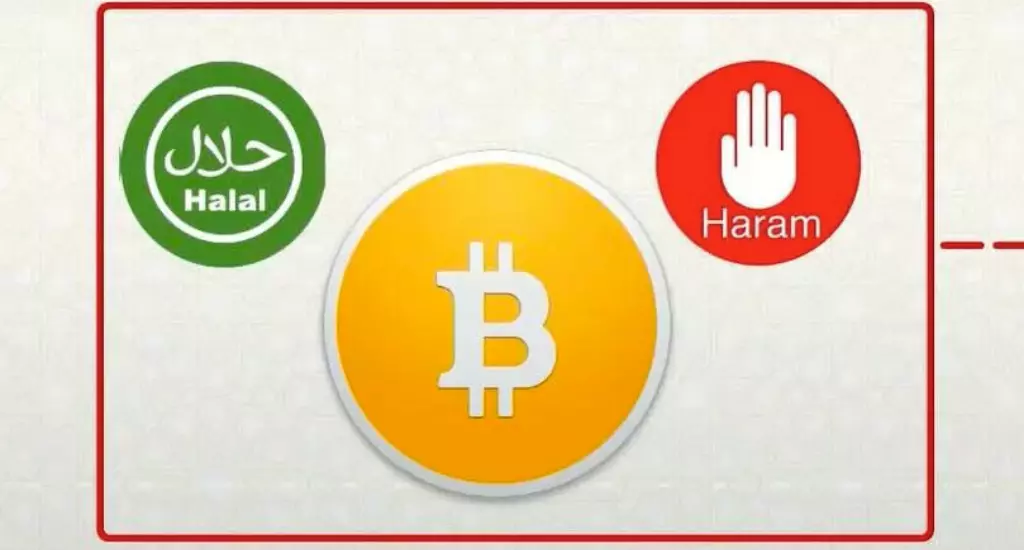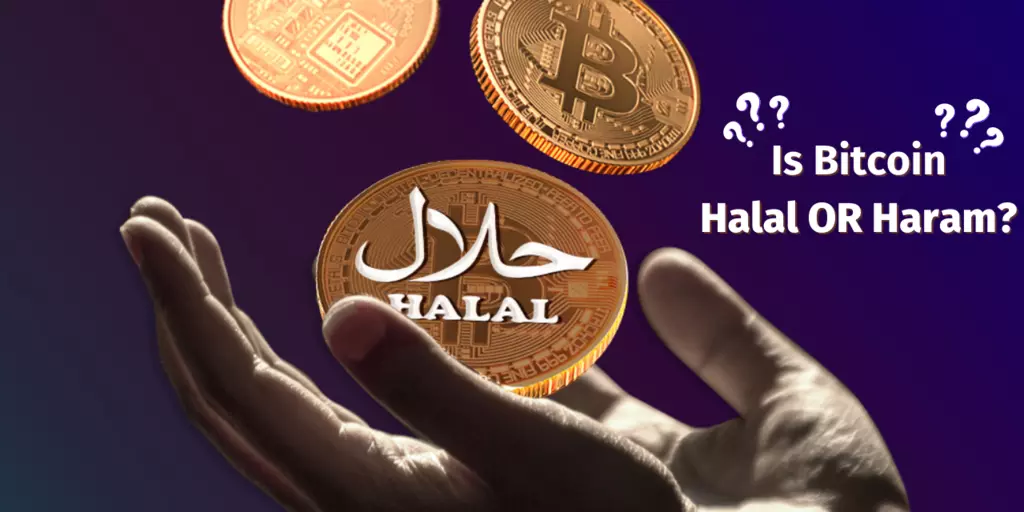In the previous several years, cryptocurrencyhas seen significant growth in investor interest. The most famous cryptocurrency, Bitcoin, reached a 7-year high in November 2023, so it’s only natural that people want to get their hands on some of this in-demand digital cash.
However, there is some disagreement among Muslims as to whether or not Bitcoin is halal. Sharia law, Islam’s legal code governing financial transactions, can be murky regarding cryptocurrencies due to their novelty.
Islamic Finance: What’s Halal or Haram?
By definition, Islamic finance refers to any financial dealings that adhere to the tenets of Sharia law, derived from the Quran’s teachings and Muhammad’s life.
Some financial transactions are permitted (halal) by these Islamic guidelines, while others are not (haram). Due to religious restrictions, Islamic financing differs significantly from conventional banking.
As an illustration, lending money at exorbitant interest rates (known as riba) is considered exploitative since it benefits the lender at the borrower’s expense.
Other Prohibited Actions
Maisir, Or Speculative Conduct
Many Muslims consider this activity to be forbidden. This indicates that betting on outcomes of events over which one has no control is prohibited by Sharia law. That’s because it’s unproductive to rely on luck to amass money.
However, options, futures, and other derivatives that involve speculation are halal because they adhere to the standards established by the International Swaps and Derivatives Association (ISDA), which is dedicated to fostering the growth of derivatives markets that are both efficient and safe and that respect Sharia law.
As examples of haram, or forbidden commercial practices, we may think of the sale of meat, alcoholic beverages, and tobacco products.
Halal Financial Practices Include:

- Mutual benefit financing (Mudarabah) between clients and financial institutions.
- Leasing (Ijara)
- Joint ventures are where both parties invest their own money and then split the earnings and losses according to a predetermined formula.
- Conventional Islamic Contract Advances (Salam and Istisna).
- Money in Islamic finance does not have what is known as “intrinsic value,” which refers to a currency’s actual worth beyond its current market value.
- Making money off of money, such as through interest from a loan, is forbidden in Islam. Making money just for the sake of making money is prohibited in Islam.
Only via lawful means of exchange and investment is wealth creation possible. This means that we need to put our financial resources to good use. Investments must also have a positive social and ethical impact on society, per the additional principles of Islamic finance.
How Do Cryptocurrencies Operate?
Some services and products accept Bitcoin and other cryptocurrencies as payment. In addition, they may be traded with other crypto investors.
Due to its anonymity, cryptocurrency is frequently used for haram transactions. The dark web had Bitcoin transactions totaling $872 million in 2018.
However, more and more establishments are beginning to accept digital currencies as their own due to their rising popularity. Companies including Microsoft, Expedia, and Amazon now accept Bitcoin as payment.
It’s possible that it’s not forbidden to use Bitcoin to buy Sharia-compliant items and services and the question is, Is bitcoin halal? However, “most [cryptocurrency] users have a speculative desire to generate profit, rather than trading it as with money,” as stated in a research article. Buying cryptocurrencies with the expectation of price appreciation is akin to gambling.
Among Islamic teachings, gambling is among the most strictly prohibited. On the other hand, what if you only want to buy a cryptocurrency and use it to make purchases? Similarly, would you use fiat currency?
What Leads To Label Crypto As Haram?
Three key factors may lead that is Bitcoin and other cryptocurrencies to be deemed halal or haram:
- It’s a gamble-like venture with big stakes.
- It has a variety of applications apart from those of currency.
- Neither the government nor the financial institutions regulate it.
Cryptocurrencies Are Risky Investments
The value of a cryptocurrency is not pegged to the dollar’s value but somewhat fluctuates based on supply and demand. Since prices may rise or fall so rapidly due to these factors, the market is considered highly volatile. One Bitcoin was valued at close to £50,000 in November of 2021. The market worth was less than £15k by June of 2022.
Therefore, investing in cryptocurrency is akin to gambling, which is forbidden in Islam.
Cryptocurrency Isn’t Money
According to one study, there are “limitations to being labeled money” in crypto. While fiat currency may be used to buy things, cryptocurrency is usually held as an investment. This is reflected in the practices of mainstream financial institutions. To differentiate between money and crypto, many people are shifting away from the word cryptocurrency and toward crypto assets.
Islam teaches that monetary value should be based on authentic goods and services. Put it toward anything you want or need. Is Bitcoin halal money until it can be used to buy groceries?
Not all Muslims have this position. Therefore you may want to consider whether cryptocurrency is money, an asset, or neither.
Cryptocurrency Is Uncontrolled
If governments and financial institutions can properly control cryptocurrencies, some Muslims are open to the concept that it may become approved in Islam. For instance, if crypto trading is regulated, governments and banks may view it as sharf or convert a foreign currency (crypto) into domestic currency (cash).
It is potentially lowering the level of risk and uncertainty associated with cryptocurrencies. The United States is only one of several countries beginning to regulate cryptocurrencies. However, as of yet, no nation with a predominantly Muslim population has legalized Bitcoin and made Bitcoin halal.
Is Cryptocurrency Permitted Under Islamic Law?
There are various arguments against the legitimacy of Bitcoin from a Muslim perspective. However, not all Muslims share this view.
An expert in Islamic finance has concluded that virtual currencies are, in theory, consistent with Sharia law. They have a Sharia policy recognizing crypto as a legitimate money or asset. In addition, they advise Muslim crypto traders to evaluate each cryptocurrency purchase or project on its own merits to determine whether it is halal or haram.
Bitcoin and other cryptocurrencies avoid the haram practice of interest by not creating riba. For that reason, it could be less divisive than charging excessive interest on loans.
If you’re used to investing in stocks and shares, buying cryptocurrency will seem familiar, but with far higher degrees of risk and unpredictability. For Muslims, bitcoin may be forbidden due to the inherent dangers and the absence of regulation.
It all comes down to intent, which may make or break whether crypto is considered halal or haram. It could be okay if you’re not buying it for speculation on its value going up and utilizing it to buy permitted items.
Are There Any Islamic Scholarly Opinions On Crypto?
As it is, many Islamic experts agree that Islam forbids Bitcoin. Trading in cryptocurrencies is now illegal in Indonesia, the country with the most significant Muslim population in the world. The Indonesian Ulema Council warned against cryptocurrencies due to “elements of doubt and damage” and the fact that it lacks “a tangible form, a defined value, [or] a known precise quantity.” Government-compliant cryptocurrencies, however, will be accepted.
A second Islamic expert, Dr. Anas Amatayakul, has cautioned Muslims to “for now” refrain from purchasing or trading cryptocurrencies. Because of this, there is the possibility for development in cryptocurrency, particularly concerning easing the religion’s restrictions on its use.
How can Sharia-compliant Muslims save?
Muslims may struggle to find a way to balance their finances with their religious values. However, there are several opportunities for halal savings and investing strategies.
Sources
- IIBI (2023). “Mudarabah” Islamic Banking https://www.islamic-banking.com/explore/islamic-finance/shariah-rulings/question-answers-shariah-rulings/mudarabah#:~:text=The%20term%20refers%20to%20a,gets%20nothing%20for%20his%20labour
- Ijaracdc (2023). “IJARA AS AN OPERATING LEASE” Ijaracdc https://ijaracdc.com/ijara-as-an-operating-lease/
- Eardley, N. (2014). “What is halal meat?” BBC https://www.bbc.com/news/uk-27324224
- Farell, R. (2015). “An analysis of the cryptocurrency industry” PennLibraries https://repository.upenn.edu/cgi/viewcontent.cgi?article=1133&context=wharton_research_scholars
- Virgana, R. A. E., Harahap, P., & Anwar, T. A. (2018). “Conceptual research: Sharia-based cryptocurrency” 3rd International Conference on Management Economics and Business of Universitas Mercu Buana (ICMEB) https://repository.widyatama.ac.id/items/dc5fb9ea-fb69-4f01-a940-d25c24a40e42
- Chodorow, A. (2016). “Bitcoin and the definition of foreign currency” Fla https://heinonline.org/HOL/LandingPage?handle=hein.journals/ftaxr19&div=20&id=&page=















